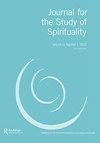在物质世界中过精神生活:实现和平衡的四个关键
IF 0.8
0 RELIGION
引用次数: 0
摘要
在过去,Gaventa认为专业人士应该认识到灵性在提供服务中的重要性。他认为,对精神的承诺将有助于推动行业超越单纯的政策和合规,为员工提供更深层次的使命感和使命感,为客户提供更充实的生活。Gaventa在他的结论(第五部分)中提出了同样的论点,将逻辑扩展到我们所有人,即我们的友谊和社区关系将在促进包容,多样化和精神联系的地方变得完整。他没有假装包容的社区会很容易形成和维持,而是认识到残疾人有他们的特质和挑战(就像其他人一样)。Gaventa讲故事,提出策略,帮助读者理解为什么会出现具有挑战性的行为,以及如何创造提供积极行为支持的环境——尊重每个人的精神,以及精神关怀的社区。虽然由贝勒大学出版社出版,《残疾与灵性》的目标读者更多的是实践者,而不是学者。就像许多书名中有“残疾”的书一样,它可能会吸引一小部分读者,但我希望它能得到更广泛的读者。那些想从新的角度思考灵性问题的人最好考虑一下残疾的含义。对我来说,这本书的主要缺点是,加文塔主要利用了基督教和犹太教的精神,提到了一些伊斯兰教和印度教(但不多)。缺失的是对非裔美国人灵性和土著灵性的广泛讨论。当然,人们不能指望一个作者和一本书涵盖所有主题,Gaventa关注他生活和工作的背景是可以理解的。因此,我提出这个批评,是希望其他人能在他的工作基础上,对这些丰富的传统中很少有人发声的残疾和精神提供新的见解。本文章由计算机程序翻译,如有差异,请以英文原文为准。
Living a spiritual life in a material world: four keys to fulfillment and balance
were in times past, Gaventa argues that professionals should recognise the importance of spirituality in the delivery of their service. He believes that a commitment to spirit will help move the industry beyond mere policy and compliance, facilitating a deeper sense of calling and vocation for workers, and fuller lives for clients. Gaventa makes much the same argument in his conclusion (part V), extending the logic to all of us, that our friendships and community relationships will be made whole where they facilitate inclusive, diverse, spiritual connections. He makes his case without pretending that inclusive communities will be easily formed and sustained, recognising that people with disabilities have their idiosyncrasies and challenges (just like everyone else). Ever practical, Gaventa tells stories and suggests strategies to help readers understand why challenging behaviours occur, and how to create environments that provide positive behaviour supports — respect for the spirit of every person, and communities of spiritual care. Although published with Baylor University Press, Disability and Spirituality is aimed at practitioners more than it is at scholars. As with many books that have ‘disability’ in the title, it is likely to attract a narrow audience, but I hope that it gets a wider readership. Those looking for fresh ways of thinking about spirituality would do well to consider the implications of disability. For me, the book’s major weakness is that Gaventa draws mostly on Christian and Jewish spirituality, with some mention of Islam and Hinduism (but not much). Missing was an extended discussion of African-American spirituality, and indigenous spirituality. Of course, one cannot expect a single author and a single book to cover every topic, and Gaventa understandably focuses on the context in which he has lived and worked. So I make this criticism in the hope that others will build on his work to provide fresh insights about disability and spirituality in these rich traditions that are rarely given voice.
求助全文
通过发布文献求助,成功后即可免费获取论文全文。
去求助
来源期刊

Journal for the Study of Spirituality
RELIGION-
CiteScore
2.50
自引率
7.10%
发文量
25
期刊介绍:
Journal for the Study of Spirituality is a peer-reviewed journal which creates a unique interdisciplinary, inter-professional and cross-cultural forum where researchers, scholars and others engaged in the study and practices of spirituality can share and debate the research, knowledge, wisdom and insight associated with spirituality and contemporary spirituality studies. The British Association for the Study of Spirituality (BASS) organises a biennial international conference and welcomes enquiries about membership from those interested in the study of spirituality in the UK and worldwide. The journal is concerned with what spirituality means, and how it is expressed, in individuals’ lives and communities and in professional practice settings; and with the impact and implications of spirituality in, and on, social policy, organizational practices and personal and professional development. The journal recognises that spirituality and spiritual values can be expressed and studied in secular contexts, including in scientific and professional practice settings, as well as within faith and wisdom traditions. Thus, Journal for the Study of Spirituality particularly welcomes contributions that: identify new agendas for research into spirituality within and across subject disciplines and professions; explore different epistemological and methodological approaches to the study of spirituality; introduce comparative perspectives and insights drawn from different cultures and/or professional practice settings; aim to apply and develop sustained reflection, investigation and critique in relation to spirituality and spiritual practices; critically examine the values and presuppositions underpinning different forms of spirituality and spiritual practices; incorporate different forms of writing and expressions of spirituality.
 求助内容:
求助内容: 应助结果提醒方式:
应助结果提醒方式:


